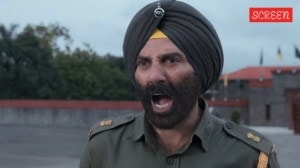Click here to follow Screen Digital on YouTube and stay updated with the latest from the world of cinema.
Yennai Arinthaal to Vidaamuyarchi: When Ajith Kumar, the father, took over from AK, the superstar
Ajith Kumar's decision to change the tide of his films started with the release of Yennai Arinthaal, which hit the screens in February, 2015, a month before the birth of his son, Aadvik, and a month after the seventh birthday of his daughter, Anoushka.
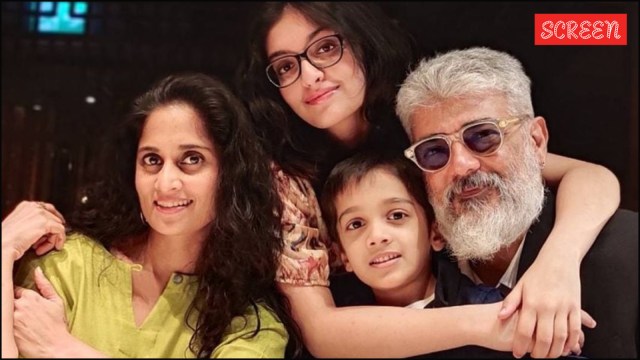 Looking at the past decade of Ajith Kumar's films, it is clear he puts family first.
Looking at the past decade of Ajith Kumar's films, it is clear he puts family first.Jason Momoa, just a generally top-class guy, once said, “My kids are my greatest piece of art. If I can pump them full of amazing stuff and surround them with beautiful art and music, then I’m going to live out my life watching them.” As parents, choosing the songs they listen to, the movies they watch, and the books they read, is paramount to shaping their world views, and understanding of their own selves. But what if you are not just another parent? What if you are in a field that has the power to influence many? What if you are in the top echelons of an industry, and have the power to make others’ creativity sing and dance to your own tunes? That’s a good enough definition of stardom, and it is this superpower that actor Ajith Kumar has wielded in the past ten years to change the flavour of his films altogether.
Of course, it is a given that Ajith might have had a say in all his films since his ascension to superstardom in the early 2000s, but there can be no doubt that in the past decade, things have changed beyond recognition. He has made eight films in the past ten years, and each of those films existed for two reasons — 1) To impart a few socially conscious messages 2) To recalibrate his fandom. This decision to change the tide of his films started with the release of Yennai Arinthaal, which hit the screens in February, 2015, a month before the birth of his son, Aadvik, and a month after the seventh birthday of his daughter, Anoushka.
There can be no doubt that fatherhood changed the way Ajith approached his films. There, of course, was always the doubt that racing was his one true passion, and cinema just fuelled the resources to follow his one true love. But his brand of cinema and stardom attracted scores of loyal fans, who stood by him throughout the ups and downs of his career. And Ajith acted in at least one film a year to satiate their desires. But he always wanted to push the envelope of acceptance of his choice of lead roles. Not many would agree to do a Mankatha as their landmark 50th film, or actually at any point of their career. Not many superstars would agree to do a small cameo in a role that is far from being one with starry airs like the one he did in English Vinglish. Not many superstars in their 40s would accept their grey hairs and embrace it with gusto. Yes, Ajith was different, but the Ajith after Yennai Arinthaal was a different Ajith altogether.
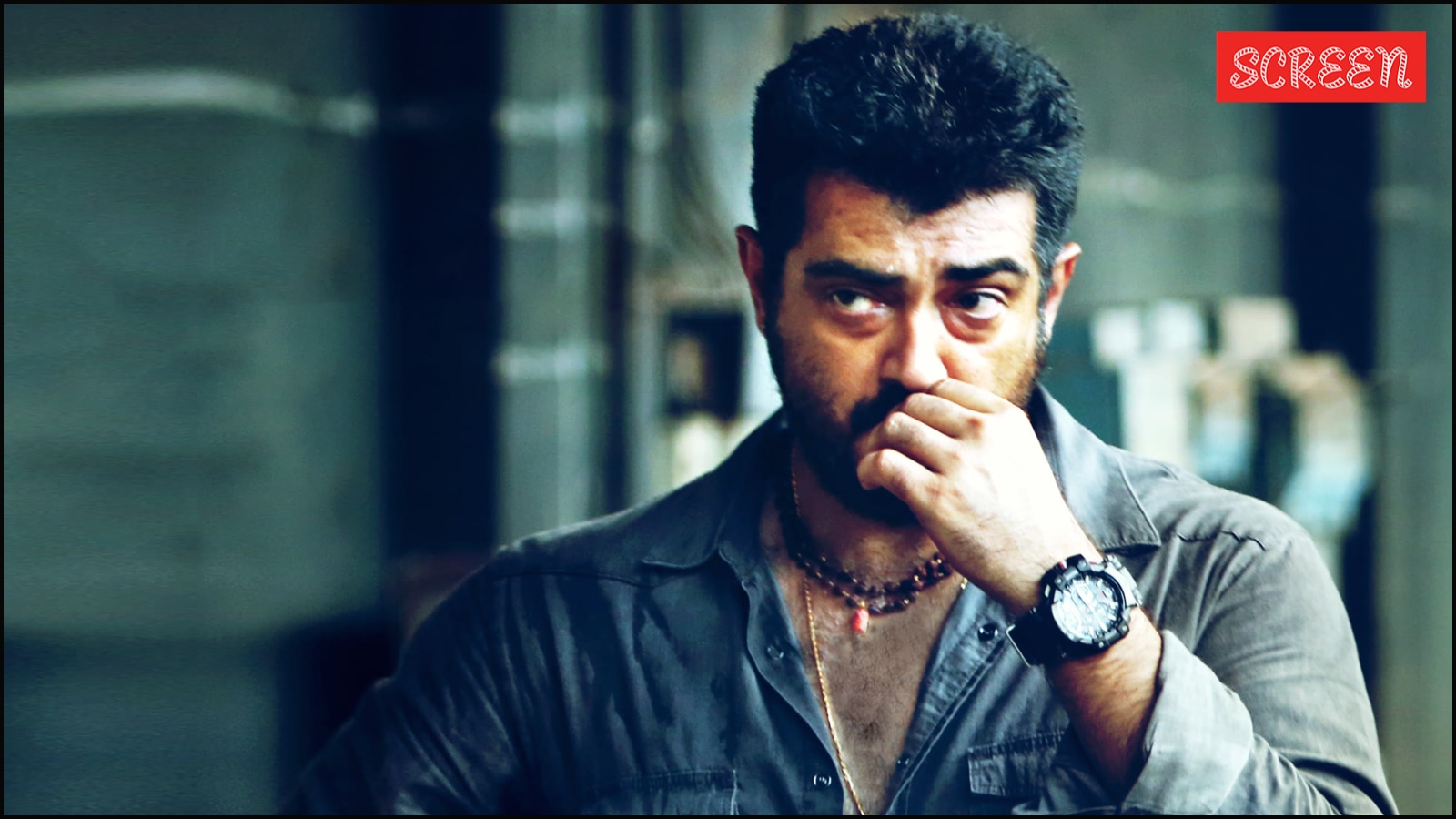 Ajith Kumar played a straightforward no-nonsense cop in Yennai Arinthaal
Ajith Kumar played a straightforward no-nonsense cop in Yennai Arinthaal
In an interview to The Hindu, director Magizh Thirumeni, who helmed the recent Ajith film, Vidaamuyarchi, said, “Ajith sir is keenly observing what is happening the society. There is misogyny, chauvinism, violence against women… he is looking at all of this. He told me that it’s time for payback. ‘Since all stories have been told from a masculine point of view, let’s question that status quo. Let’s rattle that system.’ Which A-lister would do this?” And this changeover happened once he became a father of two. You can see the colour of his films changing once he decided to exercise a sense of control over what the protagonist says and does. Probably why, he continued to just work with two directors since then. Two young directors who would give him a ear and listen to what he wanted to achieve through his films.
That is why, in Vedalam, even though he played a ruthless gangster in the flashback portions, he turns over a new leaf after understanding how money doesn’t hold a candle to the strength in helping others. Also, he doesn’t waste time in romancing heroines as he doesn’t have a pair in the film. He also gets to tell a rich man who has fallen in love with his sister to take a chill pill and allow women to finish their education and follow their dreams before chaining them down to socially constructed institutions.
 Ajith Kumar plays a gangster who has a change of heart in Vedhalam.
Ajith Kumar plays a gangster who has a change of heart in Vedhalam.
That is why, in Vivegam, even when he is playing an international agent with a betrayal bogging him down completely, he takes time out to call up his heavily pregnant wife and say a word of assurance. He does have a pair, but there is no running around trees anymore. They are already married when we meet them, and whenever he is home after an assignment, he is the one taking care of the household duties as she is a bustling entrepreneur.
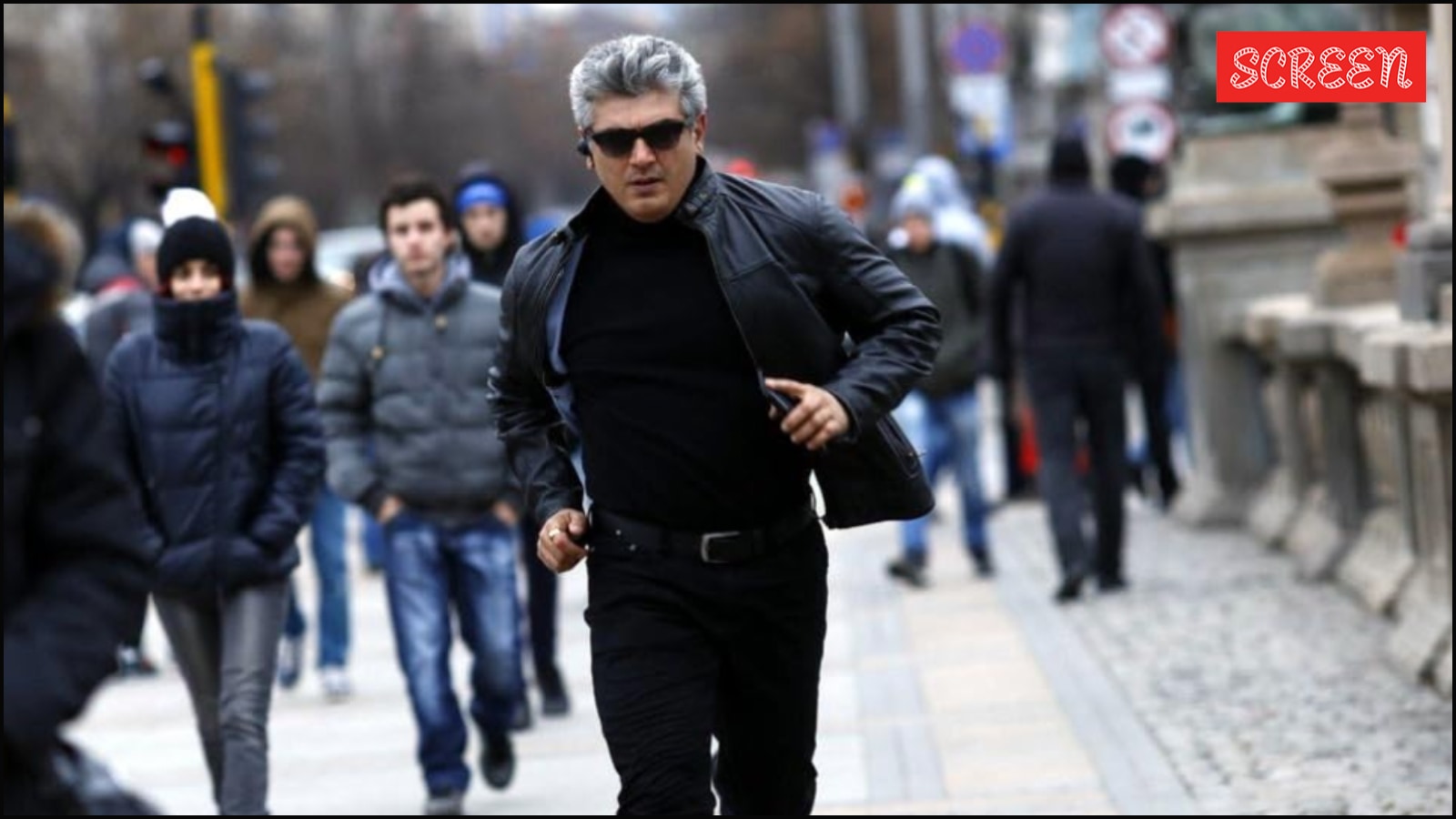 Ajith Kumar plays a spy who is wronged by his own brethren in Vivegam.
Ajith Kumar plays a spy who is wronged by his own brethren in Vivegam.
That is why, in Viswasam, even when he is playing a village chieftain doubling up as a ruffian, he rejects the proposal of marriage by a city-bred doctor who has fallen in love with him. He argues about their differences, and points out the possible repercussions of being with him, giving her a chance to make an informed opinion. And later, when she decides to walk out of the marriage fearing his past would catch up with the future of their newborn daughter, he keeps a respectable distance without enforcing his wishes on his wife’s desires and fears. Of course, the heroism comes into play when his daughter is in danger, but throughout the film, he is only a protective father, and never pushes the agenda of a husband missing his wife. He respects her till she decides about his need in their lives.
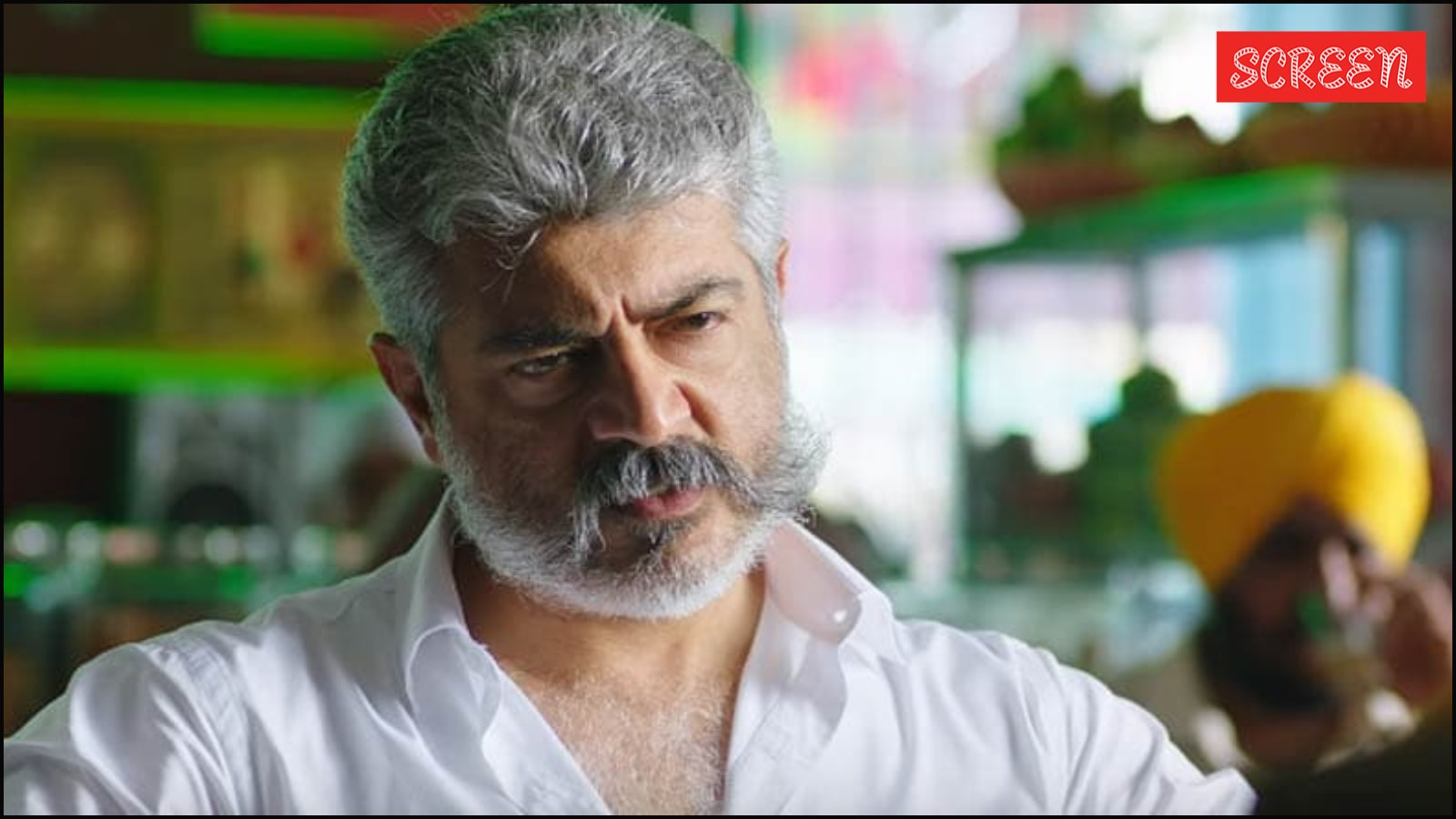 Ajith Kumar plays a ruffian with a golden heart in Viswasam.
Ajith Kumar plays a ruffian with a golden heart in Viswasam.
That is why, in Nerkonda Paarvai, even though there is Vidya Balan, and a beautiful song by Yuvan Shankar Raja, it is used to showcase a lawyer who is rankled by immense personal guilt. He is trying to become a better man, who finds some sort of redemption by taking on the case of three hapless women who are fighting to save their reputation against powerful men. He tries to reason out with people about the hypocrisy in our society, and how easy it is to slut shame and victim blame. It was also the film where it was clear that Ajith is going to say these things, and not care if today’s generation understands what is being told. He wasn’t making a film for today. He was making it for tomorrow, when his kids grow up.
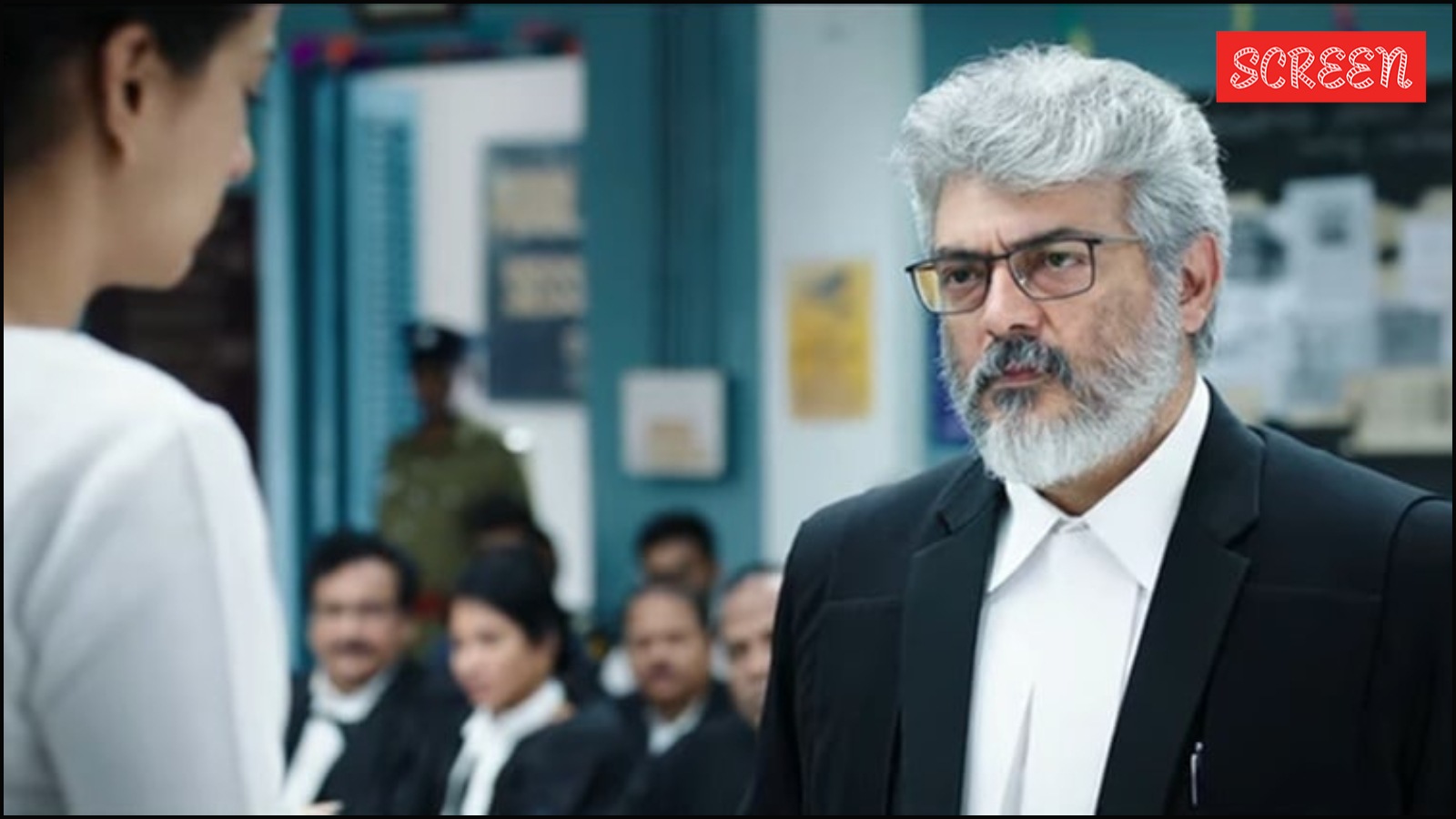 Ajith Kumar plays a burdened lawyer in Nerkonda Paarvai, the Tamil remake of Pink.
Ajith Kumar plays a burdened lawyer in Nerkonda Paarvai, the Tamil remake of Pink.
That is why, in Valimai, in the pursuit of saving a society from being addicted to drugs, and keeping his family safe, there is no time for love. The leading lady in the film is an integral part of the action sequences and investigation, and isn’t just existing to service the elevations. There was also a layered social commentary on the police force’s extra-judicial killings.
 Ajith Kumar played a cop waging a war against drugs in Valimai.
Ajith Kumar played a cop waging a war against drugs in Valimai.
That is why, in Thunivu, even though he plays a mercenary-for-hire, there is a sudden change of heart due to the benevolence shown to him and his team by a random family. There is no romantic interest explicitly explored in Thunivu, but there is a wonderful equation with Manju Warrier’s character that is based on friendship and companionship, and we are never really told if they are in a romantic relationship. And even here, although the spotlight remains firm on him, she isn’t relegated to the shadows either.
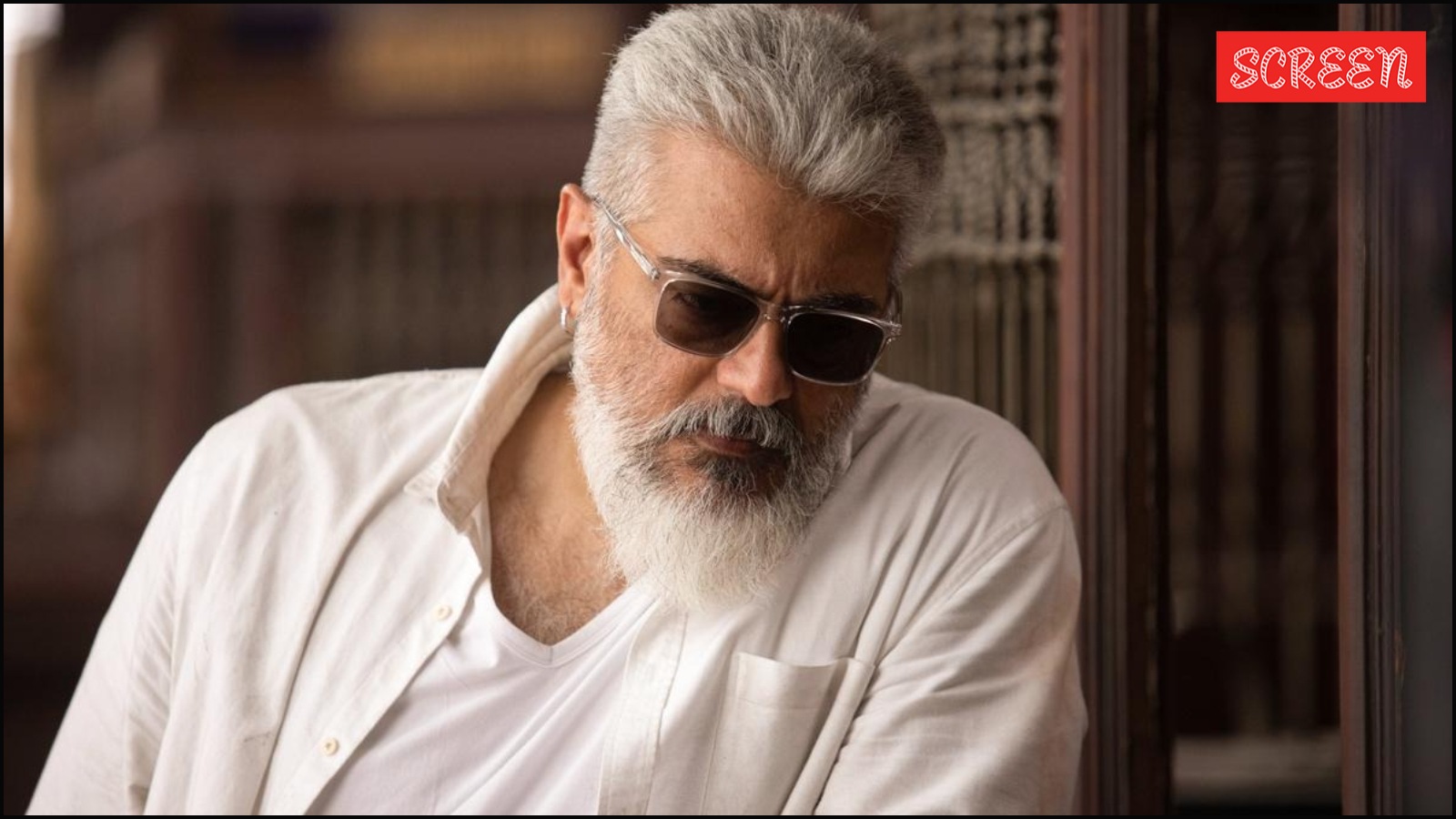 Ajith Kumar plays an international criminal with a strong conscience in Thunivu.
Ajith Kumar plays an international criminal with a strong conscience in Thunivu.
And now, in Vidaamuyarchi, Ajith is shown as a husband who has to come to terms with his wife’s affair, and not just live through the guilt of not being adequate enough, but also wanting her to not feel bad about walking out on them. It is a very thin line, and the character expertly manages to make us empathise with him without antagonising the woman in the equation. Of course, there is also the other aspect of his characterisation that is stripped of heroism for almost the entire film, but the focus is still on him being a guilt-ridden husband rather than an iron-fisted hero. Being a smart man, he understands why she chose to walk out of the marriage, and realises where things went wrong. He has all the answers and no solutions, and yet, there is never a moment where he insults his wife or reprimands her. He understands. This might seem the natural order of things, but look at the upheaval on social media, and you will know why this is monumental.
 Ajith played a simple man caught in an extraordinary situation in Vidaamuyarchi.
Ajith played a simple man caught in an extraordinary situation in Vidaamuyarchi.
Now, Ajith’s daughter Anoushka is 17, and his son Aadvik is 10. If both of them watched all the films their father has starred in after they were born, it would almost be like Ajith Kumar is the most sanitised superstar of Indian cinema. Probably that was the idea. And probably Ajith at 44 isn’t the Ajith at 54. Evolution of thought processes is a natural order of things. Just that, we are seeing his evolution being showcased on the biggest of platforms. But this also leads to arguments that the entertainment quality of his films are slowly getting diluted to accommodate his social concerns.
At the end of the day, people who started following his work when he made his debut, and continued to support him till he was 44, can’t be suddenly asked to break out of the commercial cinema shackles and enjoy his films despite them not hitting the mark on masala film sensibilities. Considering Ajith is a recluse, the only connect fans had with him was to see him on the big screen. They were ready to give him one Yennai Arinthaal sandwiched between a Veeram and a Vedalam. But, in some ways, Ajith got ahead of the curve in an industry where fandom plays a pivotal role in the ascension of superstardom. In fact, there might be hundreds of better actors than the biggest Indian superstars, but it is the latter that decide the course of action in any industry. That is the place Ajith held in 2015, and in his own way, still holds it in 2025.
However, in the past decade, no other star distanced themselves from the mania of stardom and fandom like Ajith did. It was almost like he was prepping them to understand that he was an accidental actor, and a reluctant superstar. He would prefer to live under the radar for as long as it pleased him. His films would service his own ideas, and not service the star or the fans. One good thing is that these ideas are not ones that pull back society. Nevertheless, Ajith’s decision to change the flavour of his filmography came at the expense of fans’ expectations.
The writing on the wall has been very clear. Even if his sudden return to the spotlight due to his reinvigorated interests in racing is heartwarming, and appeases his fans, Ajith doesn’t stop himself from asking them to find other avenues to express that energy. “You are shouting and cheering, and saying ‘Long live, Ajith’ or ‘Long live, Vijay’… when are you going to live for yourself?” asked Ajith in a recent interview to Dubai media on the sidelines of the Dubai 24H race. It is not a statement that is told without thinking twice. Here is a star who enjoys the economic freedom cinema gives him to pursue his passions. It is clear cinema is not the primary fuel to get him out of bed every day. And it is actually beautiful how Ajith has decided to sculpt his movies to cater to how he wants his children to see him.
But, it is clear that he understands that his fans are restless. And in some way, he might have also understood that his children have grown up, and can make informed decisions about what kind of people they want to be in this world around them. From what we have seen of his next, Good Bad Ugly, directed by Adhik Ravichandran, it is clear that it is going to be nothing like what his films from 2015 have been. Is it that one film where he lets go off self-imposed restrictions and gives a film for his fans who stood by him all these years? Did he sit down with the now older Anoushka and Aadvik and inform them about why he would have to do certain things in his films because he is a superstar of a particular stature?
 Ajith Kumar and Shalini with Anoushka and Aadvik. Courtesy: Shalini, Insta
Ajith Kumar and Shalini with Anoushka and Aadvik. Courtesy: Shalini, Insta
Come what may, there can be no doubt that for the past decade, Ajith prioritised being a father over everything else. He internalised that his kids were his greatest piece of art. He had the ability to pump them full of amazing stuff and surround them with beautiful, and more importantly, meaningful art. And as he races around in the circuits of the world, at the back of his mind, he’d know they would be proud of him for the films he stood by when even his own cinematic world was against him. And for a superstar who could have been a lot of things, it is beautiful how Ajith wanted to be a father first before being anything else. Is this the right way? Debatable. Did it make his fans happy? Probably not. Did he miss out on the golden years of a superstar’s career? Sure. But doing all this, was he happy?
Well… What do you think?
- 01
- 02
- 03
- 04
- 05


















